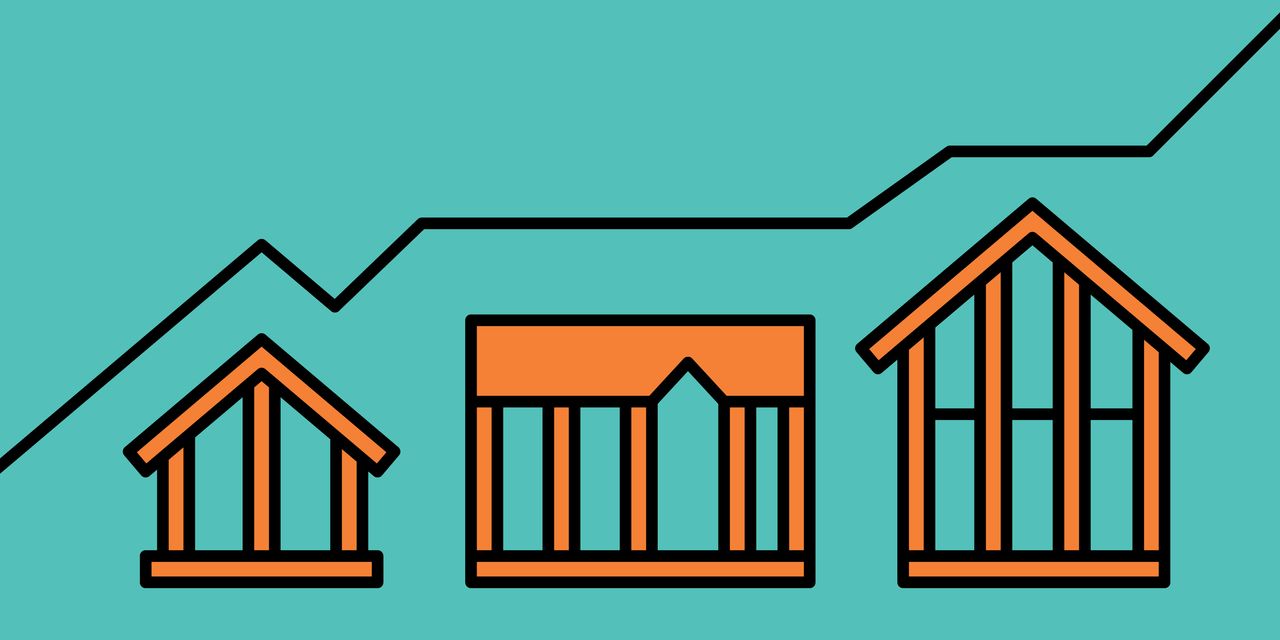Inflation, rising interest rates, and too few homes for sale have battered residential real estate since the pandemic. One bright spot is home construction, which has rallied on news that new-home sales have actually risen. Builders
D.R. Horton,
Lennar,
and
NVR
are up between 29% and 33% this year, well above the
S&P 500’s
13% gain. Smaller builders performed even better:
Green Brick Partners
and
Beazer Homes USA
—both with market caps below $3 billion—have returned 108% and 112%, respectively.
Sales of previously owned homes, which make up the bulk of transactions, were down 20% in May compared with a year ago, while new-home sales were 20% higher. With mortgage rates reaching 6.81%, homeowners with lower rates are staying put, allowing builders to fill the breach.
This imbalance is likely to continue for the rest of the year, keeping the streak going for the stocks. Demand has returned to a point where builders can raise prices, says Wedbush analyst Jay McCanless. “That’s going to be a tailwind for the group for the rest of the year.”
Most builders are set to report quarterly earnings in mid- to late July. Since the housing market began to moderate last summer from its frothy pandemic pace, comparisons are expected to become easier in the second half.
BTIG analyst Carl Reichardt, who has Buy ratings on
PulteGroup,
D.R. Horton, and
Lennar,
notes that the outlook for builders’ margins, which compressed as rising rates caused buyers to stay on the sidelines, is uncertain. But “if inventories stay thin and these companies remain disciplined in their pricing approach, home builders ought to gain market share,” he says.
Next Week
Monday 7/10
The Federal Reserve reports consumer credit data for May. Total consumer credit rose at a seasonally adjusted annual rate of 5.7% in April to a record $4.86 trillion. Revolving credit, chiefly credit-card debt, jumped 13.1%, while nonrevolving credit, such as home mortgages and auto loans, increased 3.2%.
Tuesday 7/11
President Joe Biden attends the 74th NATO Summit in Vilnius, Lithuania, which runs for two days.
The National Federation of Independent Business releases its Small Business Optimism Index for June. Consensus estimate is for a 89.9 reading, slightly higher than the May figure. The index remains anchored near a decade low, as supply-chain disruptions and labor shortages—even as they have eased some in the past year—continue to hurt small businesses.
Wednesday 7/12
The Bureau of Labor Statistics releases the consumer price index for June. Economists forecast that the CPI will increase 3.1% year over year, nearly a full percentage point less than in May. The core CPI, which excludes volatile food and energy prices, is seen rising 5%, three-tenths of a percentage point less than previously. The CPI is at its lowest level since March 2021, and the core CPI since November 2021.
The Bank of Canada announces its monetary-policy decision. Traders are pricing in a two-in-three chance that the central bank will raise its key short-term interest rate by a quarter of a percentage point, to 5%. The BOC began this hiking cycle the same month as the Federal Open Market Committee, March 2022, and raised interest rates nine times, bringing them from 0.25% to 4.75%.
Thursday 7/13
Cintas,
Conagra Brands,
Delta Air Lines,
Fastenal,
and
PepsiCo
release quarterly results.
The BLS releases the producer price index for June. The PPI is expected to rise a scant 0.4% year over year, while the core PPI is seen increasing 2.5%. This compares with gains of 1.1% and 2.8%, respectively, in May. The PPI is at its lowest level since late 2020, and the core PPI since early 2021.
The Department of Labor reports initial jobless claims for the week ending July 8. Claims averaged 255,000 in June, the most since late 2021, a sign that the hot labor market might be cooling.
Friday 7/14
Second-quarter earnings season kicks off with three of the largest banks—
Citigroup,
JPMorgan Chase,
and
Wells Fargo
—reporting. S&P 500 earnings are expected to decline 6.8% year over year. That would mark the largest drop since second-quarter 2020’s 31.6% plummet.
BlackRock,
State Street, and
UnitedHealth Group
announce earnings.
The University of Michigan releases its Consumer Sentiment index for July. The consensus call is for a 65.8 reading, slightly higher than June’s. Consumers’ expectations of inflation for the year ahead was 3.3% in June, the lowest in more than two years.
Write to Shaina Mishkin at [email protected]
Read the full article here





